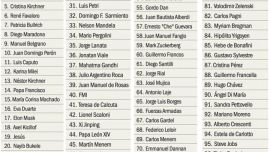Civil society organisations, opposition politicians and press organisations have condemned a move by President Javier Milei to trim government transparency rules and limit public access to information.
Milei, a self-described “anarcho capitalist” who campaigned as a “liberal-libertarian,” issued a government decree on August 30 altering a 2016 law introduced by the Mauricio Macri administration to improve state transparency.
The new rules redefine the scope of Macri’s 2016 law, setting specifications on what kind of information may be requested. Amongst others, it prevents access to "the working papers" and "deliberations" of officials, as well as information about their private life.
The measure appears in the Official Gazette as Decree 780/2024, amending Law N° 27.275 defining access to public information.
The move met with widespread repudiation from rights watchdogs. More than 70 civil associations signed an open letter published Tuesday that called for the repeal of this latest measure.
“A decree cannot limit access to public information," was the reaction from dozens of organisations, among them FOPEA (Foro de Periodismo Argentino), CELS (Centro de Estudios Legales y Sociales), Amnesty International Argentina and the ACIJ (Asociación Civil por la Igualdad y la Justicia).
For the signatories, the presidential measure "implies a serious regression in the interpretation of the right of access to information in the light of international human rights standards and the battle against corruption."
They also considered that its application "generates a discretionary framework for norms."
‘Domestic sphere’
The Public Information Access Law, enacted in 2016, is a tool to promote civic involvement in the transparency and control of public administration.
It forces the three branches of the State, the Public Ministry, companies, political parties, universities and trade unions receiving public contributions to respond to requests for information made by any citizen within no later than a month.
Milei’s decree argues that there is a need to restrict the “scope” of the concept of “public information.” It excludes by its very nature information within the private sphere of an official or magistrate, especially when the request seeks to enter a “typically domestic sphere.”
“It will not be understood as public information Anything containing data of a private nature generated, obtained, transformed, controlled or guarded by human persons or legally private entities or with a committed public interest absent, alien to the administrative record of those persons whose enumeration in Article 7 of Law 27.275 is obligatory, will not be understood as public information,” specifies one of its amendments.
The decree also includes new requirements in order to request data from the state.
Changes had been trailed in late July, when Treasury Attorney Rodolfo Barra stated that all requests for information regarding the number of dogs living with President Milei at Quinta de Olivos presidential residence, a sensitive issue, ought to be rejected.
Barra, in response to a consultation by presidential chief-of-staff Karina Milei, determined that they were “banal” questions and that those requests for access should be rejected because they were about matters within the President’s “private” life.
The legal beagle further complained that such a request had been submitted at all and urged no similar enquiries to be made. The rejected request had sought public information on the costs of upkeep for the four presidential mastiffs, as well as the construction of kennels at the presidential residence.
The government has now made that position official with its decree, though it has gone even further, establishing limits which have set off alarm bells from organisations working to defend freedom of speech.
Echoing Barra’s complaint, the decree introduces the "principle of good faith" for every request, authorising the imposition of compensation to be paid by those violating the law or abusing their rights.
“The violation of the principle of good faith by all parties involved shall fall under the provisions of Article 10 of the Civil and Commercial Code,” it reads. That article empowers judges to impose “damages” on anyone abusing their rights.
‘Breadth and vagueness’
The ADEPA (Asociación de Entidades Periodísticas Argentinas) press association warned that the move will make it harder for journalists to report on topics that are in the public interest.
The new exceptions “owing to their breadth and vagueness, could equip officials to ignore their obligation to permit access to public information on the pretext of generic ‘damages’ or grounding their failure to comply on a presumed 'public interest,'” the press watchdog warned.
Critics say the law could prevent scandals from the private lives of government officials from coming to light.
The decree establishes that “public information shall not comprise anything containing private data,” including events at the Olivos presidential residence, such as family reunions, the number or existence of pets, intimate or reserved visits.
Macri’s centre-right PRO party was one of several parties to criticise Milei’s move to limit access to public information.
The 2016 law “must be maintained intact,” said the party in a statement issued by its lawmakers in Congress.
“This law is fundamental for the citizenry as guaranteeing an essential right in any democracy: the free and unrestricted access to public information,” it argued
"This right not only promotes transparency and accountability but also provides citizens with greater control and supervision over state actions,” it continued.
“Altering this norm via regulation without the due consensus represents a regression in terms of transparency and public control, essential elements for the good functioning of our democracy,” the text concluded.
Santiago Caputo’s pay
Prior to his first appearance in Congress as the sitting Cabinet Chief, Guillermo Francos on Tuesday filed a series of responses to questions put to him by lawmakers who are seeking more information about Milei’s La Libertad Avanza administration.
Among them was a query about the remuneration of top presidential advisor Santiago Caputo, who – due to his contract of employment – is not obliged to present a sworn affidavit detailing his assets, unlike Cabinet ministers.
The Secretariat-General of the Presidency, headed by presidential chief-of-staff Karina Milei, informed that Caputo is classified in the ‘Consultant II’ category, receiving a monthly paycheque of just over 2.5 million pesos.
Caputo “performs consultancy tasks under a non-permanent employment modality for non-permanent tasks,” continued the response, which detailed activities including “leading consultancy projects in the specific professional field; planning and executing consultancy activities in a specialised professional field; putting together strategic proposals with theoretical and practical content to obtain results.”
No additional information was provided about the “consultancy projects” he heads.
Replies are still pending to questions about Caputo's role in the restructuring of what is now the State Intelligence Secretariat (SIDE), and his tasks in the process.
President Milei came out to defend his top advisor this week, saying in a television interview that he was the “architect of victory” – a reference to last year’s election win.
The consultant is criticised because “he has an IQ several times above average,” argued Milei.
“I am a friend of Santiago's and I consider him part of the ‘iron triangle,’ made up of my sister [Karina Milei], him and me,” said the head of state.
– TIMES/NA/PERFIL



















Comments